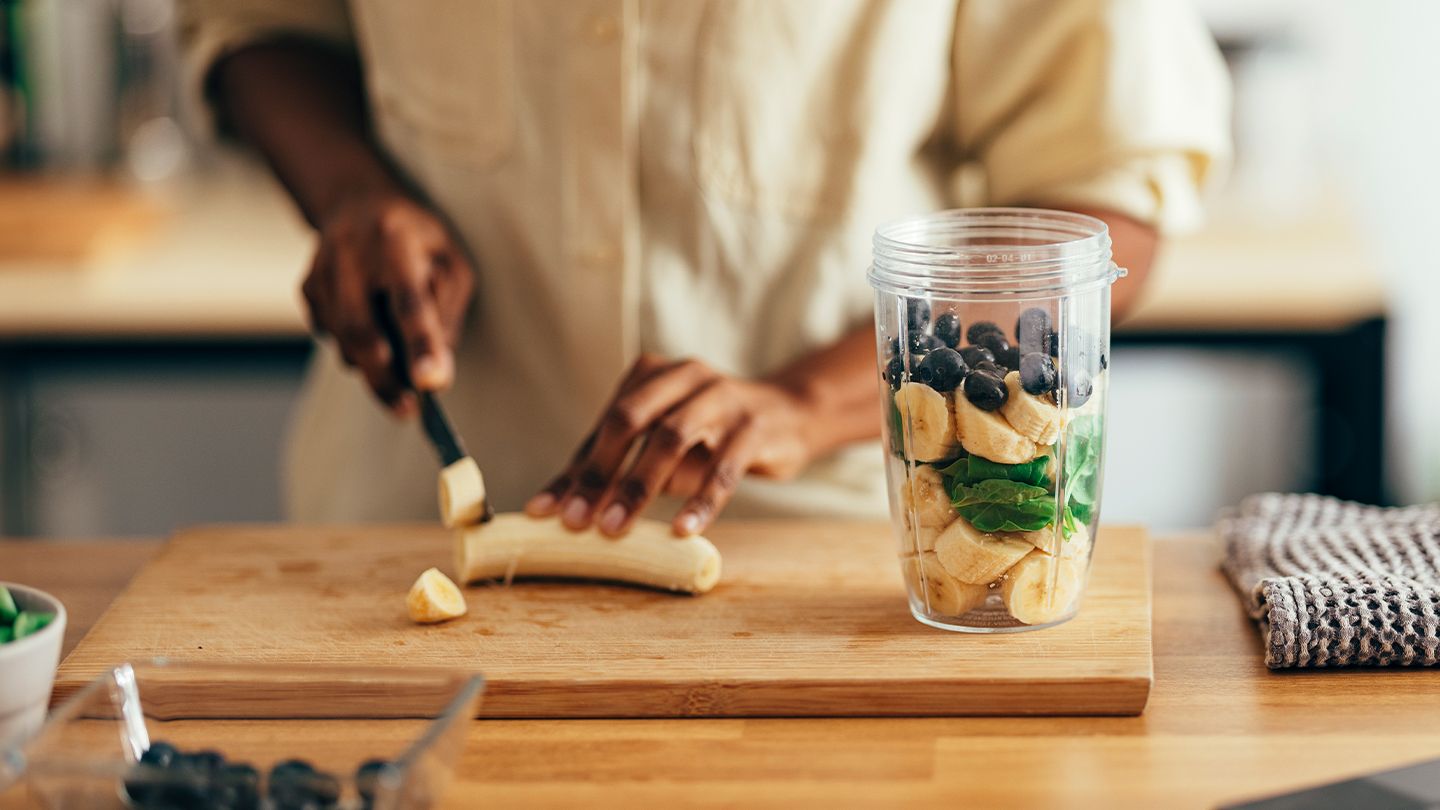The clock strikes midnight, the confetti falls, and the New Year’s Eve festivities reach their peak. You’re excited for a fresh start — but instead of waking up energized, you’re left with a wicked hangover.
Here’s the good news: Your breakfast choices can significantly impact your recovery, which is why we asked two registered dietitians to recommend the best low-calorie hangover foods to reach for on January 1. Turns out, the best choices promote things like hydration, electrolyte replenishment, and blood sugar stabilization — all components of a healthy body. Not only will these foods help battle your hangover, but they’ll also give you a nutritious start to the new year.
Water-Rich Foods
Alcohol can dehydrate you, leading to a lot of the uncomfortable symptoms you wake up with the next morning. “Typical hangover symptoms like headaches, fatigue, and dry mouth can all be made worse by dehydration,” says Kelsey Kunik, RDN, an intuitive eating dietitian at Graciously Nourished.
To rehydrate your body — and hopefully lessen the pain — Kunik recommends eating water-rich foods. Research shows that the moisture content of hydrating foods can contribute up to 20 to 30 percent of total water intake, making them crucial for proper hydration.
“Hydrating fruits and vegetables, like melons, berries, peaches, cucumbers, and bell peppers, have a high water content to help you stay hydrated,” says Kunik. Not only do these fruits and veggies provide essential fluids, but their vitamins and antioxidants may also play a pivotal role in reviving the body when you’re hungover.
Foods to Replenish Your Electrolytes
The dehydration caused by alcohol can make you lose essential minerals known as electrolytes, including sodium, potassium, and magnesium. Electrolytes are crucial for maintaining proper fluid balance, nerve function, and muscle contractions in the body, and when they are depleted, it can lead to hangover symptoms.
According to the National Institutes of Health, many people rely on certain sports beverages to remedy an electrolyte imbalance and reduce the severity of a hangover, but eating electrolyte-rich foods can also help.
“Foods like bananas, which are rich in potassium, can help restore electrolyte balance,” says Trista Best, RD. “Coconut water is another excellent option, as it contains potassium and magnesium. Additionally, consuming broth-based soups can provide sodium and other electrolytes.”
Other foods to boost your electrolytes include leafy greens like spinach and kale. Whether in a smoothie or salad, these greens increase hydration and deliver essential vitamins, minerals, and fiber.
Blood Sugar Stabilizers
When you drink alcohol, there may be a reduction in blood sugar levels, leading to fatigue, irritability, and cravings for sugary foods — which isn’t helpful if you’re on a weight loss journey. So when it comes to your post-drinking meal, be sure to consume healthy carbohydrates, which include fruits, whole grains, and beans.
Whole-grain toast or crackers are good low-calorie options to stabilize your blood sugar. Greek yogurt with fresh fruit and a handful of almonds also strikes the perfect macronutrient balance, providing a nutritious blend of protein, healthy fats, and natural sweetness.
Protein and Healthy Carbs
Protein and carbohydrates can also play important roles in hangover recovery. Protein helps fix the damage done to your body’s tissues caused by the stress alcohol puts on them. Additionally, carbohydrates replenish glycogen stores that may be depleted due to alcohol metabolism, helping to boost your energy after a night of drinking.
Protein-rich foods like Greek yogurt, legumes, nuts, seeds, and eggs can help remedy your hangover. Eggs, in particular, provide essential nutrients like choline that support liver function. Conversely, whole-grain toast or crackers offer complex carbohydrates that support blood sugar stabilization. Therefore, a balanced combination of high-protein foods and complex carbs, such as an omelet with whole-grain toast, can help ensure a comprehensive nutritional approach to combat your hangover.
While incorporating these low-calorie hangover foods into your diet can help reduce your hangover symptoms, a healthy January 1 begins on December 31. “While drinking and celebrating, make sure you’re also drinking plenty of water and eating balanced meals and snacks leading up to January 1,” says Kunik. “This strategy will help your body metabolize alcohol more easily and prevent or lessen a nasty hangover the next morning.”
Editorial Sources and Fact-Checking
- Guelinckx I, Tavoularis G, König J, et al. Contribution of Water from Food and Fluids to Total Water Intake: Analysis of a French and UK Population Surveys. Nutrients. October 14, 2016.
- Mackus M, van de Loo AJAE, Garssen J, et al. The Role of Alcohol Metabolism in the Pathology of Alcohol Hangover. Journal of Clinical Medicine. October 25, 2020.
- Alcohol’s Effects on Health: Hangovers. National Institute on Alcohol Abuse and Alcoholism. Accessed December 1, 2023.
- Electrolytes. National Library of Medicine. July 24, 2023.
- Engler PA, Ramsey S, and Smith R. Alcohol Use of Diabetes Patients: The Need for Assessment and Intervention. Acta Diabetologica. April 2013.
- Gonçalves RV, Costa AMA, and Grzeskowiak L. Oxidative Stress and Tissue Repair: Mechanism, Biomarkers, and Therapeutics. Oxidative Medicine and Cellular Longevity. February 27, 2021.
- Steiner JL, Crowell KT, and Lang CH. Impact of Alcohol on Glycemic Control and Insulin Action. Biomolecules. September 29, 2015.
- Myers M and Stevenson Ruxton CH. Eggs: Healthy or Risky? A Review of Evidence from High-Quality Studies on Hen’s Eggs. Nutrients. June 7, 2023.
- Physiology, Carbohydrates. National Library of Medicine. Last updated May 12, 2023.

